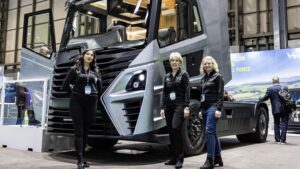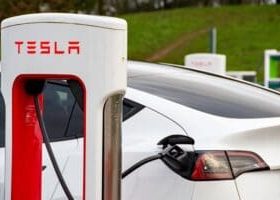The billionaire brothers who own Asda have invested into a fledgling zero-emission lorry company and plan to create Britain’s first network of hydrogen fuel stations to support the decarbonisation of Britain’s 300,000 heavy goods vehicles.
HVS, founded in Glasgow as Hydrogen Vehicle Systems in 2017, is testing and developing a lorry running on hydrogen fuel cells at the automotive industry’s Mira proving ground at Nuneaton, Warwickshire, after winning £21 million of taxpayer-funded grants.
The company also has attracted £30 million of investment from Mohsin and Zuber Issa, the Anglo-Asian businessmen who made their fortune with the Euro Garages petrol station business that they have merged with Asda, the supermarkets chain they bought during the pandemic.
HVS plans to start production by 2026 as a first mover in a sector that is proving slow to cut its carbon emissions. The company is searching for potential factory sites in the Midlands and with the devolved governments of Northern Ireland and Scotland, where respectively Wrightbus and Alexander Dennis produce hydrogen buses, and in Wales.
Pete Clarke, co-founder of HVS and its head of design, said the company had been set up in response to the statistic that across Europe lorries account for 1.5 per cent of the vehicles on the road but more than 20 per cent of carbon dioxide emissions. Yet the sector — led by the likes of Daimler, Volvo and the Volkswagen-owned Scania and Man — has been slow to embrace the transition to net zero, not least because of the difficulties of fuelling a vehicle that needs to carry heavy payloads over long distances.
HVS believes the industry is coming round to the idea that battery-electric lorries are not the solution because of the weight of the batteries needed, the lack of range, the length of time that they take to recharge and the stress on the national power grid of ever more electric vehicle chargers.
Rather than retrofitting a conventional lorry, HVS has designed its new hydrogen vehicle around the optimal distribution in a lorry of fuel cells, high-pressure tanks and the cooling technology needed. The company says its vehicle will have a range of about 350 miles and can be refuelled in roughly the same time that it takes to fill a diesel lorry’s tank.
Key to the adoption and commercialisation of hydrogen heavy lorries is fuel price — it needs mass hydrogen production and government incentives to more than halve the present cost to a viable £5 per kg — and a refuelling network. It is understood that the Issa brothers’ EG Group believes that a hydrogen long-range lorry fleet can be serviced by only seven strategically sited hydrogen filling stations on the motorway network: at Dover, on the northern stretches of the M25, in the Midlands and near Bristol, Manchester, Leeds and Glasgow.
Under government mandates, all new HGVs will have to be zero emission by 2040. “The time is now to get ready for that transition,” Clarke said. “We are currently reducing the number of diesel lorries on the roads at a rate of 1 per cent per year. The industry needs to change and it needs to hurry up. Our goal is to be a disruptor in a very conservative sector where truck design hasn’t changed in decades, and to come to market as soon as possible.”
Jawad Khursheed, 34, a Glasgow-based entrepreneur, rescued HVS from insolvency in 2020, restructured its debt and brought in the Issas. He said the company was in talks to supply lorries to Asda and other supermarket groups, as well as delivery companies such as Amazon, DHL, UPS and Fedex.
With few indigenous British automotive start-ups emerging during the emissions transition in the industry, Khursheed said he did not want HVS to repeat the mistakes of Arrival. That company, listed on Nasdaq, built production facilities in Oxfordshire and its workforce ballooned to 2,800 before it quit Britain last year without assembling the thousands of vans, buses and taxis a year that it had promised.
Read more:
Billionaire Issa brothers back hydrogen-powered lorry start-up






